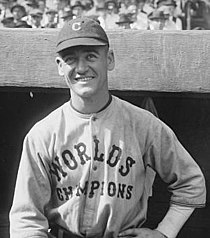George Burns (first baseman)
| George Burns | |||
|---|---|---|---|
 |
|||
| First baseman | |||
|
Born: January 31, 1893 Niles, Ohio |
|||
|
Died: January 7, 1978 (aged 84) Kirkland, Washington |
|||
|
|||
| MLB debut | |||
| April 14, 1914, for the Detroit Tigers | |||
| Last MLB appearance | |||
| September 26, 1929, for the Philadelphia Athletics | |||
| MLB statistics | |||
| Batting average | .307 | ||
| Hits | 2,018 | ||
| Home runs | 72 | ||
| Runs batted in | 951 | ||
| Teams | |||
| Career highlights and awards | |||
|
|||
George Henry Burns (January 31, 1893 – January 7, 1978), nicknamed "Tioga George", was an American first baseman in Major League Baseball (MLB) who played for five American League (AL) teams from 1914 to 1929.
One of the league's top right-handed batters of the 1920s, he was named the AL Most Valuable Player in 1926 with the Cleveland Indians after batting .358 and setting a major league record with 64 doubles. A career .307 hitter, he retired with 2,018 hits, then the third-highest total by an AL right-handed hitter. His 1,671 games at first base were the most by an AL right-handed player until 1940; he still ranks third in league history.
Born in Niles, Ohio, Burns was a line drive hitter and a solid defensive first baseman who hit .300 or better in all but one of his full seasons between 1918 and 1927. After four unremarkable seasons with the Detroit Tigers (1914–17), he was acquired by the Philadelphia Athletics in 1918. In his first season with the team he hit .352, surpassed only by the .382 of Detroit's Ty Cobb, and led the AL in hits (178) and total bases (236) while also setting a league record with 109 double plays at first base (Earl Sheely surpassed the mark three years later). After slipping to .296 in 1919, he was sent to the Indians in May 1920.
During the 1920 regular season, Burns was stuck behind regular first baseman Doc Johnston; but his play revived in the World Series, in which he and Johnston were platooned by manager Tris Speaker. Burns started Game 6, and with the Indians up 3–2 in the Series and no score in the sixth inning, Burns doubled home Speaker with the only run of the game as the Indians edged the Brooklyn Dodgers 1–0 to take a 4–2 lead in the nine-game series. Cleveland won again the next day, capturing the first Series title for the franchise.
...
Wikipedia
